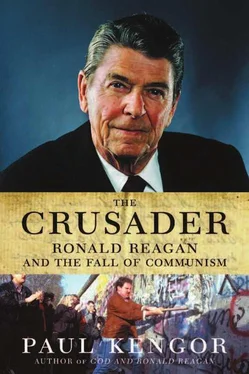103. Kenneth Adelman in Hannaford’s Recollections of Reagan, 5.
104. Reagan, “The President’s News Conference,” January 9, 1985. On January 14,
1988, he said flatly: “SDI is not a bargaining chip.” Reagan, “Statement on the Soviet-U.S. Nuclear and Space Arms Negotiations,” January 14, 1988.
105. Reagan, An American Life, 548, 608.
106. Reagan, “Statement on SDI,” March 23, 1987.
107. Reagan, “Interview With Foreign Broadcasters on the Upcoming Soviet-United States Summit Meeting in Geneva,” November 12, 1985.
108. Reagan, “The President’s News Conference,” October 22, 1987.
109. Ed Harper testimony is published in Thompson, ed., Leadership in the Reagan Presidency, Pt II, 125.
110. Thatcher recalls a discussion she had with Reagan on SDI: He admitted to her that he was unsure whether it could work, though he felt it warranted investigation. Yet, said Thatcher, Reagan told her that even if SDI was not developed it would be an enormous economic burden on the USSR: “[The president] argued that there had to be a practical limit as to how far the Soviet government could push their people down the road of austerity.” Margaret Thatcher, The Downing Street Years (New York: HarperCollins, 1993), 467. Richard Allen spoke to this: “I don’t believe Reagan saw SDI as a shield you could put over the United States, and it would be invulnerable. I believe that he thought that this was far out enough that if we put some big bucks behind it, the Soviets would have to fall for it.” Schweizer, Victory, 136, 277–78. Reagan’s new national security adviser, John Poindexter, said that Reagan “understood just what he had in the SDI system, and that it posed a grave challenge to the Kremlin.” For additional illuminating statements on SDI and the Reagan buildup as forces for change in the Soviet Union, see remarks by Soviet officials on the public television documentary, “Messengers from Moscow,” WNET-New York, PBS, 1995. 111. NSDD-153, January 1, 1985. NSDD on file at RRL.
112. James A. Nathan, “Decisions in the Land of Pretend: U.S. Foreign Policy in the Reagan Years,” Virginia Quarterly Review, Winter 1989, 13. Nathan says he was told this by a senior NSC aide.
113. Edward Wright testimony before University of Virginia’s Miller Center in Thompson, ed., Leadership in the Reagan Presidency, Pt II: Eleven Intimate Perspectives, 182. 114. Transcript of Nitze’s remarks in Wohlforth, ed., Witnesses to the End of the Cold War, 40.
115. Ken Adelman said that Reagan kept the SDI program from being hashed and rehashed by his staff and “gummed to death” by the bureaucracy. “No other president,” wrote Ken Adelman, “would have been as romantic, even visionary, as to launch and push the concept the way Reagan did.” Ken Adelman, The Great Universal Embrace (New York: Simon & Schuster, 1989), 298.
116. “Geneva Meeting: Memcons of Plenary Sessions and Tete-A-Tete,” November 19–21, 1985, declassified May 2000, RRL, Box 92137, Folder 2.
117. Reagan, An American Life, 14–15, 637.
118. Quoted in Morris, Dutch, 570.
119. Reagan, An American Life, 708.
120. Reagan, “Address to a Special Session of the European Parliament,” Strasbourg, France, May 8, 1985.
121. Reagan, “Remarks at the Annual Convention of the American Legion,” Seattle, Washington, August 23, 1983.
122. Reagan, “Interview With Morton Kondracke and Richard H. Smith of Newsweek Magazine,” March 4, 1985.
123. Reagan, “Remarks and Q & A With Reporters on Domestic and Foreign Policy Issues,” March 25, 1983.
124. Interview with Bill Clark, August 24, 2001.
125. “Reagan’s Foreign Policy—His No. 1 Aide Speaks Out,” U.S. News & World Report, May 9, 1983.
126. See Schweizer’s works, including his The Fall of the Berlin Wall, 40; Also see Pipes, Vixi, 158. CHAPTER 17
1. Data cited by Reed, At the Abyss, 215. At the time, the United States was second and Saudi
Arabia was third.
2. See Schweizer’s works, including his The Fall of the Berlin Wall, 45–46. 3. Paul Taylor, “Furor Over Remarks Fails to Dismay Bush,” Washington Post, April 14,
1986; Schweizer, Victory, 242–43; and Richard Alm, “Alarm bells over cheaper oil; while consumers cheer plummeting prices, Vice President Bush and others are warning enough is enough,” U.S. News & World Report, April 14, 1986, 24. A read of the U.S. News & World Report article demonstrates the extent to which the media was unaware of the true reason for the increase in Saudi oil production and low prices.
4. Interview with Roger Robinson, June 6 and 8, 2005. See Richard V. Allen, “The Man Who Changed the Game Plan,” The National Interest, Summer 1996, 64; Schweizer, Victory, 140–44, 261; and Schweizer, Reagan’s War, 239.
5. CIA report is cited in Schweizer, Victory, 261–63.
6. Cited in Schweizer, Victory, 261–63.
7. On this, Peter Schweizer gives a number of examples. Schweizer, Victory, 263.
8. Ibid., 166.
9. See analysis by Grigorii Khanin in Ellman and Kontorovich, eds., The Disintegration of the Soviet Economic System, 77.
10. Richard V. Allen, “The Man Who Changed the Game Plan;” and Schweizer, Victory, 262.
15. Schweizer, Victory, 255–56, 261.
16. Prince Turki al-Faisal, “Allied Against Terrorism,” The Washington Post, September
17, 2002, A21.
17. Bush’s role in this was very interesting. For a discussion, see Paul Kengor, Wreath Layer or Policy Player? The Vice President’s Role in Foreign Policy (Lanham, MD: RowmanLittlefield, 2000).
18. Reagan, “The President’s News Conference,” October 1, 1981.
19. Weinberger told this to Peter Schweizer. Quote is in Schweizer, ed., The Fall of the Berlin Wall, 44.
20. Reagan, “Remarks and an Informal Exchange With Reporters on the U.S. Arms Sale to Saudi Arabia,” June 3, 1986.
21. The one obstacle was probably the ambivalence and personal dealings of Vice President Bush.
22. The date of this was September 26, 1986. This information was taken from a variety of sources, including: Rodman, More Precious Than Peace, 339–40; Fred Barnes “Victory in Afghanistan: The Inside Story,” Reader’s Digest, December 1988, 87–93; and interviews. 23. Barnes, “Victory in Afghanistan,” 87.
24. Rodman, More Precious Than Peace, 336–37.
25. Barnes, “Victory in Afghanistan,” 91.
26. Cited in Rodman, More Precious Than Peace, 339. Schweizer says that the Stingers downed 75% of their targets in the first year. Schweizer, Victory, 269–70. Steve Coll says that estimates vary widely, from 30% to 75%, though he cited no source. Coll, “In CIA’s Covert Afghan War,” A1.
27. Martin Schram, “Reagan Urges U.S. Mideast Presence,” Washington Post, January 10,
1980, A3.
28. Other contemporary sources from 1980, including Lou Cannon in the Washington Post, reported that Reagan supported sending arms (in general) to the Mujahedin. Lou Cannon, “A Vision of America Frozen in Time,” Washington Post, April 24, 1980, A2. Surely, someone must have advised Reagan on the Stingers; nonetheless, the earliest on-the-record account of this idea (as far as I could find) was from the mouth of Ronald Reagan.
29. Statement from the Moscow Domestic Service, published as “Afghan ‘Basmachs’ Visit Washington Seeking Missiles,” in FBIS, FBIS-SOV-26-FEB-81, February 26, 1981, A1. 30. On this, see especially Rodman, More Precious Than Peace, 337–38. 31. Ibid., 338.
32. Barnes, “Victory in Afghanistan,” 88–89.
33. Simpson, NSDDs, 446–47.
34. Rodman, More Precious Than Peace, 337–38.
35. Barnes, “Victory in Afghanistan,” 90.
36. Rodman, More Precious Than Peace, 339; and Barnes, “Victory in Afghanistan,” 90. 37. McFarlane was interviewed by Schweizer in Schweizer, Reagan’s War, 255–56. 38. I was unable to ascertain whether these were the same group of individuals, nor the precise day of the visit.
Читать дальше












